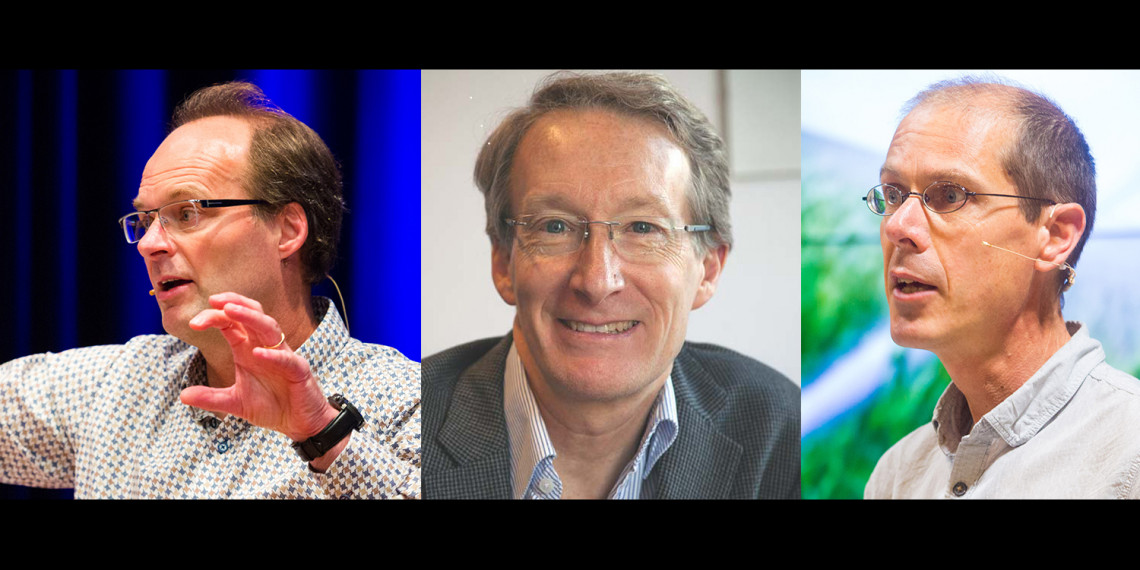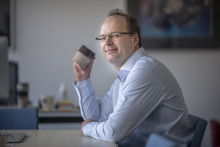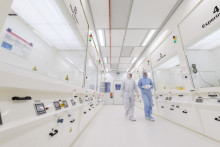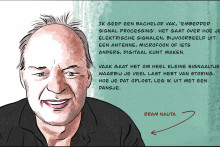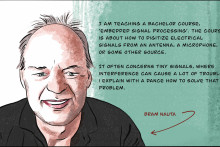This is the first time three UT researchers secured this grant in the same year. In total, seven candidates from the UT submitted proposals for this year’s ERC (European Research Council) Advanced Grant, meaning the overall UT success rate in this call was just over 40%.
Rector Thom Palstra: ‘Extremely proud and excited’
Rector Thom Palstra: ‘I’m extremely proud and excited that three UT scientists received this prestigious grant. It is not only a sign of their excellence, but also a sign of the strength of the entire university, especially because all the three recipients come from different faculties. I believe such personal grants are important, because they help us to be visible in the outside world. We are doing fantastic things here. All the grant winners are great scientists, but they are also strongly supported by the environment at our university. Getting these grants is a real team effort. Seeing that there is a 40% success rate for receiving these grants is a strong encouragement for people. It requires a lot of effort to submit these proposals, but the time you spent on strategic thinking and preparing the research proposal will help you and inspire you in the coming years.’
Food and energy for everybody
‘I think that is a big success for the UT,’ says Professor Arjen Hoekstra. ‘It is a European grant, we are competing with scientists from all over Europe. With three grants, the UT is getting a good share.’ Was the professor surprised to be one of these three? ‘You only have about a 10% chance to get this grant. I was convinced about the quality of my proposal, but you need to compete against many good people with good proposals. So you just never know, you can only hope. I was of course very happy to receive it.’
Arjen Hoekstra (Water Management group, ET Faculty) received the grant for his project EARTH@LTERNATIVES, aiming to study the amount of land and water required to make our food and energy on a global level. ‘We will look at water and land use in the past and in the future. We will study sustainability, efficiency, fair sharing and resilience, all at a very high level of detail.’
While most research focuses on one or two of these challenges at a time, Hoekstra’s project will consider the tradeoffs between them. ‘We want food and energy for everybody, but we also want to be sustainable and resilient. Sometimes these targets are in conflict with each other, which is why we will analyse synergies and trade-offs between environmental sustainability, resource efficiency, social equity and social-ecological resilience,’ he says. ‘This knowledge is key in understanding how to achieve UN’s Sustainable Development Goals with limited land and water resources.’
New wireless communication 
‘The idea behind the ERC Advanced Grant is to give it to projects with possible high risk and high gain. But the title my project is “High risk, no gain”,’ says Professor Bram Nauta (Integrated Circuit Design group, EWI Faculty). ‘The main idea of the project is to be able to receive weak signals in wireless receivers. Receivers today are complex analog electronic circuits. They include amplifier circuits to provide amplification of the weak antenna signals. Ideally the amplifiers provide linear gain, but unfortunately the amplifiers cause problems if large unwanted signals are received simultaneously with weak desired signals. Which means that you can’t receive the weak signals anymore because they are distorted by the big signals - which are amplified too much. So I started thinking: what if there is no amplifier?’
The breakthrough concept of this program is to completely remove amplifiers from wireless receivers. To that end, Nauta aims to use so called ‘N-path filters’, simple structures without amplification. ‘Essentially, I’d like to smash down any big signals before they reach the receiver,’ explains Nauta. ‘This would be a completely new way of making wireless receivers. It is high risk, because I have no idea if it’s all possible. All the blocks need to be reinvented. But if we are successful, we will be able to make smaller, cheaper and more energy efficient receivers. To bring a new way of wireless communication. And even if I’m not completely successful and only finish half the work, it is still useful. We will still be able to make the current receivers better.’
How did Professor Nauta react when he found out that he was one of the recipients of the ERC Advanced Grant? ‘I got an email which was a bit cryptic. It wasn’t clear if I received the grant or not. It just asked me to log in into the system. I tried, but my password had expired so I had to type in a new one. But I had to type it in twice and my hands were shaking. I was so nervous. I was worried I would not be able to type in the same password twice. Yet, I did and then I found out I got the grant and was very happy.’
Monitoring biodiversity
Professor Andrew Skidmore (Department of Natural Resources, ITC Faculty) shared the feeling when he was informed of receiving the grant. ‘I didn’t really know whether the grant was successful. The ERC Advanced Grants proposals require high levels of innovation and I thought it had a good chance, but it is a very competitive grant. The standards are very high. So I was very happy to be selected.’
Professor Skidmore was awarded the €2.5 million for his project BIOSPACE. ‘Its main goal is to model and globally monitor biodiversity. Biodiversity is largely affected by human land management and climate change. The climate is changing faster than species are able to adapt. Natural areas have been completely changed for agricultural purposes and spaces for people to live in. The UN, as well as companies using natural resources, want to monitor biodiversity, but unfortunately the existing methods are dependent on field observations, which is time consuming and provides an incomplete picture.’
The BIOSPACE project offers a fundamentally different approach, explains Skidmore. ‘It combines image spectroscopy remote sensing – which can give a regional to global overview - with environmental DNA profiling, which is able to analyse a whole ecosystem from a teaspoon of soil or drop of water. Both of these methods provide accurate and efficient sources of data about the environment. This will allow us to eventually monitor biodiversity from space using a new generation of satellites and contribute to meeting the UN Sustainable Development Goals.’
All the three project funded through the ERC Advanced Grant will begin later this year.


